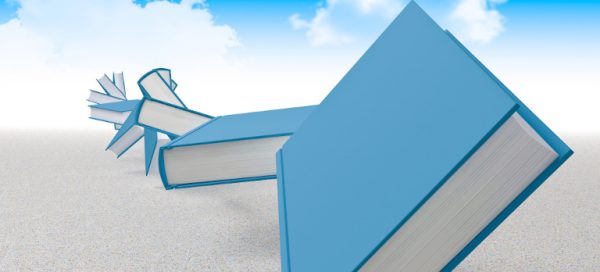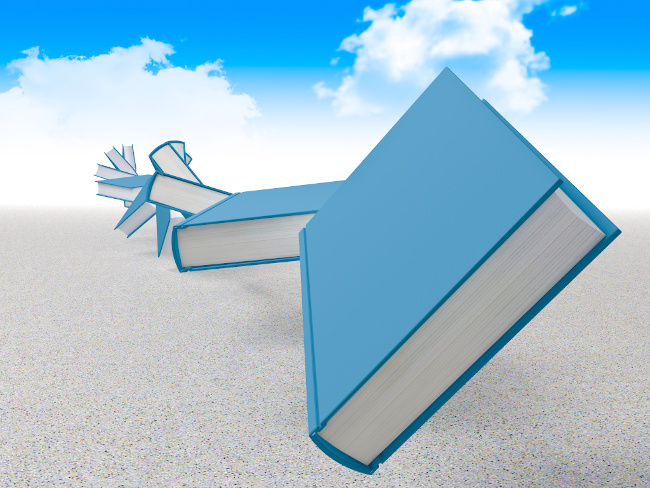
“Amateurs sit and wait for inspiration, the rest of us just get up and go to work.” – Stephen King
There’s a pervasive myth among readers and writers alike that great books come from talent. We believe that some writers are just born with a book in their heart, and that their success is fate. However, writing is a skill. Anyone can become a better writer through practice and perseverance.
Writing is also difficult work, and it can feel isolating to sit down at the desk each day and keep trying. We get into a rut, and feel like we’ve plateaued and will never get going again. Sometimes, turning to the advice of people who have done it before can help.
These books cover everything from how to edit the smallest of details in your fiction, to broad essays on why we feel the impulse to write at all. If you’re feeling stuck, demotivated, or lost, we hope one of these books might help you get going again.
1. Burning Down the House – Charles Baxter
Baxter’s collection of nine essays is less “craft book” than a sweeping examination of how the world we live in shapes how we write and read. His apt observations feel like listening to college seminars, and will help any aspiring author find meaning and depth in their own work. He examines our culture and beliefs, questioning the status quo, and often interrogating long-held “standards” of writing.
Criticisms of Burning Down the House often mention the dense nature of the essays. It’s true that Baxter waxes philosophical, often taking several paragraphs to explain an example from an existing short story or novel, but the meandering prose has a big payoff. He’ll take you down a river of extrapolation and then bring you back to the shore after you’ve begun to learn how to swim.
Burning Down the House is geared towards literary fiction, but writers of all genres can benefit from his deep insights.
2. Meander, Spiral, Explode – Jane Alison
Every person who has gone through a high-school English class knows Aristotle’s plot arc. “Beginning, Middle, and End” is the distilled mantra of his bell curve, under which he explains all stories are told. Jane Alison begs to differ. She does away with Aristotle’s arc entirely, and instead takes her readers through a myriad of other ways we can tell and interpret our stories.
Meander, Spiral, Explode is a true craft book. Each section is devoted to an entirely new way of thinking about narrative. She uses concrete examples from both classic and contemporary fiction, often citing large excerpts. Alison so deftly explains the connection between her ideas and these works that it’s not necessary to have read them previously.
Jane Alison avoids convoluted language and academic terminology, making it an excellent primer for authors looking to start in experimental and emotionally-driven fiction.
3. Thrill Me – Benjamin Percy
Benjamin Percy hates being bored. He lovingly challenges modern literary fiction for its many pages of self-indulgent pondering, the desire to push writers and their books into a genre category, and the belief that some writers are simply born with a gift. Benjamin Percy believes in you, and he will make you believe in yourself.
The chapters cover all kinds of topics, and like many craft books, Percy pulls examples from multiple types of fiction. He talks about his own writing with humility. Instead of patting himself on the back, Percy has a kind of self-deprecating humor about writing and being a writer that makes you trust him. When he uses an authoritative voice to say things like “Don’t Use Backstory” you trust him, because he also shows you someone that broke this rule successfully. Percy doesn’t want to tell you how to get from Start to Finish. He only wants to show you how to make that journey as interesting as possible.
Thrill Me is an accessible craft book, and is enjoyable to read. Percy himself denounces genre convention. This is a craft book for anyone looking to make their writing more succinct and interesting.
4. On Writing: A Memoir of the Craft
King’s On Writing: A Memoir of the Craft is as ubiquitous as King himself. Plenty of non-writers have read this essay collection, and many established authors cite it as a formative text when they were just starting out. This book is a stand-out for good reason: King covers everything.
The essays oscillate between hard, nuts and bolts advice on writing (“the road to hell is paved with adverbs”) and examinations on how having an emotional support system are vital to living a writer’s life. He includes several anecdotes about how life was when some of his blockbuster books came out, leaving you with the feeling that anyone can be a writer with the right gumption. The balance between practical advice and philosophical observations makes On Writing feel like it speaks to all aspects of being a writer.
The advice and anecdotes within are repeated in writing circles (and at the start of this list) like mantras. Read this one with a highlighter handy.
5. Syllabus: Notes From an Accidental Professor – Lynda Barry
Lynda Barry, a professor at UW-Madison, has run a class for a number of years called Writing the Unthinkable. She refers to it as the workshop for non-writers, and it blends writing and physical art in order to expand our creativity and our willingness to let our work be messy. Syllabus is a collection of her class notes, assignments, and yes, her syllabi from a handful of these workshops.
This is like no other craft book you’ll ever encounter. Barry encourages us, through unconventional exercises, to pay attention to the world around us, and to not treat art and writing as separate activities. Authors often talk about keeping a notebook, where you can journal, write down snippets when inspiration strikes, and keep hold of little things that motivate you. Barry expands on this by giving the reader exercises and examples on how to keep a notebook.
The most important thing in Syllabus; however, isn’t the advice on how to use the notebook, but the advice on how to let yourself make bad art. Creatives of all types are often bogged down by anxiety. If it’s not good immediately we often wonder if it will be good at all. Barry’s exercises train us not to second-guess our art as we’re making it. She argues that the best of our creativity happens when we aren’t even thinking about it.
Buy a composition notebook and get ready for a masterclass in letting go.
6. Steering the Craft: Exercises & Discussions on Story Writing for the Lone Navigator or Mutinous Crew – Ursula K. LeGuin
LeGuin’s craft primer is short, to the point, and an immensely useful toolkit for sweating the details of fiction. Steering the Craft eschews long essays about plot and character in favor of technique. LeGuin assembled this condensed guide from years of teaching Creative Writing courses, and she describes it as “not for beginners.” However, what she really means is that her advice isn’t meant for the casual writer. LeGuin took her writing seriously down to the sentence, and she believes you should too.
The book is split into ten chapters, each with their own exercise. She brings you to your own text and asks you “yes, but WHY did your character do this, and WHY did you write it that way?” Most craft books that include exercises are focused on generating ideas. Not this one. Steering the Craft trusts that you already have your idea, and wants to help you find the best way to get those words onto paper. LeGuin’s witty voice carries throughout, and even when she is scolding your bad habits, you thank her.
This little book is perfectly usable for a writer on their own; however, it’s true strength lies in its ability to be used in writing groups. LeGuin closes with advice on how to find a group, and advocates for the necessity of peer editing with a critical eye. Have your entire workshop group buy a copy and use it to pore over your next work, or turn to the exercises when you find yourself stuck.
Try tooleybook, the free tool created for writing books. It takes less than 30 seconds to create an account and start writing.
With tooleybook you can view timelines, chapter purpose, word count, track time and place, tag scenes, move and organize scenes and more...More Info


